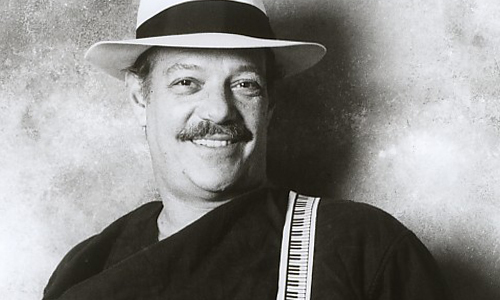By Jose Luis Seijas
For those who like salsa music, Larry Harlow is an icon: the original piano player of the Fania All Stars, one of the first signed artists for Fania records, a producer of over 240 albums, a fantastic band leader who gave us albums such as Tributo a Arsenio, Soy Latino, Abran Paso, Hommy: A Latin Opera and La Raza Latina: A Salsa Suite.
On top of all this Harlow also introduced some of salsa’s greatest singers to the scene (Ismael Miranda, Junior Gonzalez, Nestor Sanchez) and brought Celia Cruz out of early retirement to sing on one of his albums. The guy was a visionary like few others and kept himself a step ahead his peers for many many years. He was also the first one to break ranks from Fania due to unpaid royalties and rocked the boat lobbying the National Academy of Recording Arts and Sciences for Latino music to have its own set of Grammys.
In 2008 Larry won a Latin Grammy Lifetime achievement award. Few of the old Fania stars are prolific as Harlow, as he admits, “I play all over the world, I will be in London soon, then Hamburg and Barcelona right after, then Paris, Amsterdam. After that I will be in Koln, Antwerp…."
LL: Wow, and are you also recording at the moment?
LH: I am not recording at the moment, I am writing my memoires right now, I have been doing it for about a year and a half, it should be finished in about a month or two and it should come out in 2013. It is not a book about Salsa, it’s a book about my life, which has very interesting things and of course includes Salsa, but salsa it’s just a part of my life.
Indeed of all the Fania stars, Harlow’s career is perhaps the most unusual. The son of Rose Sherman, an opera singer, and Buddy Kahn, the bandleader at the Latin Quarter (nightclub) in New York under the name Buddy Harlowe. Lawrence Ira Kahn excelled at an early age at various instruments. His atin infused surroundings in New York led him to Cuba where he began an intense study of Afro-Cuban music in the 1950s but was unable to complete his degree before the Cuban Revolution forced him to leave the island. On his arrival back in New York, Larry and his orchestra, Orquesta Harlow, was the second orchestra signed to the Fania label.
Today Harlow is of a rare breed of survivors from that now iconic era of Latin music who has come through the heavy drug and alcohol-infused lifestyle of that time. Sadly, many others such Hector Lavoe, Ismael Rivera, Pete El Conde burnt out long ago and others, later - Tito Puente, Celia Cruz. Even recently two of Harlow’s colleagues past away - Yomo Toro, one of Puerto Rico’s most famous Cuatro players, and singer Junior Gonzalez, who first made his break in one Larry’s band.
LL: It cannot be easy for you, seeing people you worked so closely with die off
Yeah Yomo Toro dying was very sad, I was in Ecuador last week when it happened and with Junior Gonzalez aswell. I took 2 big hits in one month; these were some of my best friends. I knew Junior for 40 years, Yomo probably 43 years. Well, we are all getting older, I’m 73 now…
LL: On the upsdide, there has been in recent years a new Fania revival, which seems to happen every few years, but with the Marc Anthony Film and album and the sell of MP3 it seems that Fania is still strong in the scene.
LH: It is a label that right now only sell T-shirts, compilations and stuff like that, they don’t bring out new material whatsoever. It is great they keep the music alive as a testimony of a wonderful era. They put salsa on the map; brought it to a worldwide audience. A lot of kudos for Jerry Massucci in the old days, he put his money into creating this new musical genre. I was one of the lucky ones, was one of the first artists signed to the label. He used me, I used him. We had a love hate relationship…I explain all in the book! It was very healthy and very good for all of us. It took us to places we would have never gone otherwise. Basically Jerry made a career for me and I give him a lot of credit. There are issues with non-payment of royalties, not giving musicians credits when credits were due…
LL: That is like the big stigma of Fania, they were great but at the same time they took advantage of a lot of people, including you.
LH: Well, we were young and foolish and all we wanted to do was to play and make music and we did not take care of our legal responsibilities. Who else is to blame but yourself, if you are stupid enough to let others take advantage of you!
LL: You were one of the most prolific if not the most prolific producers of salsa music during the boom years…along with Louie Ramirez you put out and incredible amount of albums and introduced the most talent to the scene, do you miss those days when you were producing 5-6 or even more albums per month?
LH: I miss those days, I do. I miss the recording days; I was very very good at doing it. I studied a lot, every time a new machine came out I was right on it. We took everything from Mono, we started with Mono to the 4 Tracks, 8 Tracks, 12 Tracks, 24 to 32 then Digital! From writing Operas, to writing Symphonies, music scores for movies. We were always expanding the music to other concepts, taking salsa music to other worlds! I do miss those recording days but I have a lot of business to take care of these days also.
LL: Now that you mention opera, I have to say that your Hommy: A Latin Opera album is of my all time favorites albums… (for those who might not know, Hommy was an album/Opera loosely based on The Who album Tommy, which was performed in NY by some of the biggest salsa artist of the time, including Celia Cruz, who had been semi-retired in Mexico and was brought to NY by Harlow to play the main female role)
LH: Mine too!!!! We are trying to do it again in Puerto Rico. We are waiting for the elections to take place so we can talk to the government to help us with some funding. We would like to inject some extra extravaganza into the production. We would like to make it into a pay per view show as well as having some really famous singers: we want to involve Juan Luis Guerra, Ruben Blades, Gilberto Santa Rosa as well as Oscar de Leon, one of each from every country to make it…now that Junior (Gonzalez) is gone, Celia (Cruz) is gone, Pete (El Conde Rodriguez) is gone, only a few of us are left we need to make a new cast
LL: what about Ismael Miranda, (who was not in the original cast but still has a sensational voice
LH: rather than going for the old singers I rather go for the salsa stars! If I can get someone like Gloria Stefan, bringing Santana to do some solos, I want to do it in a big scale, for the worldwide TV coverage. If you want to do it big you really need the big, big names.
LL: I hope this happens!! Did u ever think that salsa would become so big? You put out some groundbreaking albums but did you ever think salsa was going to become so successful?
LH: I helped it to become big! That was my ambition, I had the ambition, perhaps it was my Jewish instinct, to create new things. Nobody would use trumpets and trombones in the way I did. They copied my style, they copied my arrangement technique, they copied my recording techniques, which is fine I did not mind that at all, I’m very glad they did that, but it was my who put the Fania all stars together, who made the movie, who expanded this music and took it to another level. I did their (Fania) first digital album, their first Opera, their first Suite, things like that…I just did not want to settle for the same kind of album all the time, I wanted to make something a little different.
LL: Well your albums seemed to be a bit ahead of most of your peers, you were not repetitive as many other artists of the time were, which for me was what cause the decline of Fania and salsa in general, but Do you think you are recognize for what you really were?
LH: Lets say I have my place in history, lets say that, people who really know, know what I did and I am really happy with my contribution to the genre. If I had the chance to do it all again, I would do it the same way, because I love the music so much. I would have protected myself in a better way, be a lot smarter business wise but I just love this music and it is my life.
LL: As a Latino I’m happy for all that you have contributed to our musical culture, you are not Latino but myself and probably most people in the music industry and the fans see you as one of us.
LH: That is why I did an album called “Yo Soy Latino”!!
LL: I can see you still have the passion and the love for the music, do you listen to the new people coming through? Is there anyone that has got your attention?
LH: I listen to everybody but I don’t see anybody great. Coming through the ranks I don’t see any bands coming with anything different going on… I dislike reggaeton, there is no great melodies there, it’s not a very musical genre, but as far as the salsa guys, everybody is still playing stuff from the 70s…Wherever I go the first thing they ask me is to play La Cartera !!. Recently I have been doing La Raza Latina (the Salsa Suite he composed for Fania) with a 15 piece orchestra, we have been doing some big venues, we did the Lincoln center and we did it in Miami, very nice and I am working on the Opera and I am working on 2 movie scores right now.
LL: You sound like a busy guy
LH: I stay low key, I love living in NY, I have a place in Miami, I stay in South Beach once in a while but basically I am in NY and I love it here! But yeah, I’m always on the move, I’m going to Hamburg for a salsa congress and I will be playing in London on Sunday with a band I never played with before, Dorance Lorza’s band, he is a wonderful musician, he has been around for a long time, I know his music for a long time, I’m sure they have been rehearsing and that the concert is going be great.















